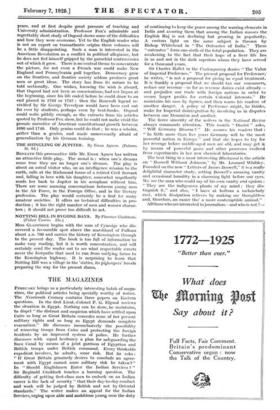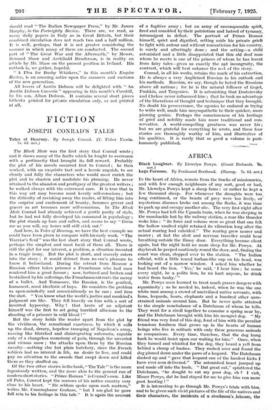THE MAGAZINES
FEBRUARY brings us a particularly interesting batch of maga- zines, the political articles being specially worthy of notice. The Nineteenth Century contains three papers on Eastern questions. In the first Lieut.-Colonel P. G. Elgood reviews the situation in Egypt. Nothing can be done, he maintains, to dispel "the distrust and suspicion which have settled upon Cairo so long as Great Britain concedes none of her present military rights and so long as Egypt demands complete evacuation." He discusses inconclusively the possibility of removing troops from Cairo and protecting the foreign residents by an improved system of police. He further discusses with equal hesitancy a plan for safeguarding the Suez Canal by means of a joint garrison of Egyptian and British troops under British command. Every thinkable expedient involves, he admits, some risk. But he asks : "If Great Britain genuinely desires to conclude an agree- ment with Egypt cannot some military risk be taken ?" In "Should Englishmen Enter the Indian Services ? " Sir Reginald Craddock touches a burning question. The difficulty of getting first-class men to embark on an Indian career is the lack of security "that their day-to-day conduct and work will be judged by British and not by Oriental standards." The writer makes an appeal for the Indian Services, urging upon able and ambitious young men the duty
of continuing to keep the peace among the warring elements in India and assuring them that among the Indian masses the English Raj is not declining but growing in popularity. A curious light on the same subject is thrown by Bishop Whitehead in "The Outcastes of India." These " outeastes" form one-sixth of the total population. They are awakening to the fact that their hope of a freer life lies in us and not in the dark superiors whom they have served' for a thousand years.
Sir Charles Mallet in the Contemporary denies "The Value of Imperial Preference." The present proposal for Preference,' he writes, "is not a proposal for giving us equal treatment. It is frankly a proposal that we should tax our consumers, reduce our revenue—so far as revenue duties exist already— and prejudice our trade with foreign nations in order to secure larger profits for certain Colonial interests." He maintains his case by figures, and then warns his readers of another danger. A policy of Preference might, he thinks, make for Imperial disintegration by involving us in disputes between one Dominion and another.
The fierce sincerity of the writers in the National Review always conunands attention. This month " Diarist " asks, "Will Germany Disarm ? " He assures his readers that : "In little more than five years Germany will be the most powerful nation in Europe" and that she hopes to try for her revenge before middle-aged men arc old, and may get it by means of powerful gases and other processes evolved from experiments in her new chemical laboratories.
The best thing in a most interesting Blackwood is the article on "Boswell Without Johnson," by Mr. Leonard Whibley. Founded on the new " Letters of James Boswell," it is a really delightful character study, setting Boswell's amazing vanity. and occasional humility in a charming light before our eyes: We see the man who could say of his own vanity and egoism : "They arc the indigenous plants of my mind ; they dis- tinguish it," and also, " I have at bottom a melancholy, east, which dissipation relieves by making me thoughtless and, therefore, an easier tho' a more contemptible animal."
All those who are interested in journalism—and who is not ?—
should read "The Italian Newspaper Press," by Mr. James Murphy, in the Fortnightly .Review. There are, we read, as many daily papers in Italy as in Great Britain, but their combined circulation does not reach two and a half million. It is well, perhaps, that it is not greater considering the manner in which many of them are conducted. The second part of "The Great War and the Aftermath," by Messrs. Bernard Shaw and Archibald Henderson, is in reality an article by Mr. Shaw on the present position in Ireland. His outlook is, we gather, hopeful.
"A Plea for Bushy Whiskers," in this month's Empire Review, is an amusing satire upon the manners and customs of the new generation.
All lovers of Austin Dobson will be delighted with "An Austin Dobson Causerie" appearing in this month's Cornhill, by his son, Alban Dobson. It contains several short pieces hitherto printed for pr;_7ate circulation only, or not printed at all.











































 Previous page
Previous page